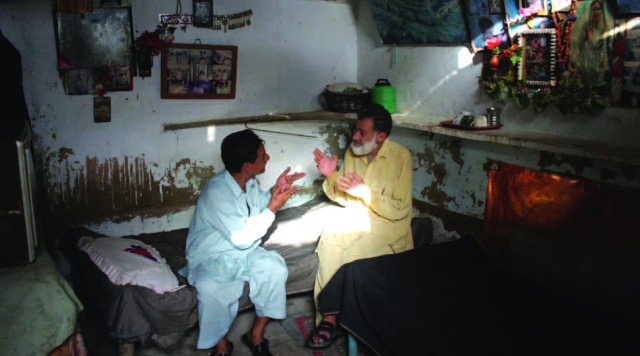Being BachaBeing Bacha

Syed Ali Shah, known as “Bacha’’, the respected one, amongst the slum-dwelling Pakhtuns of Karachi’s Sherpao Colony, has produced, acted and directed numerous video films, street theatre plays, and comedy shows for the slum locals. They are available in the colony’s video shops at an affordable price for rental. His vision has not translated to material success, but, as triumphs of the human spirit go, Bacha’s story stands alone for not surrendering to the inexorable misery of grinding poverty.
Born in Swat to a family of landless peasants in 1954, Bacha’s life seemed condemned to being unremarkable. After years of struggle, his father realised in 1963 that his family had no hope for survival in Swat and would have to migrate to Karachi to scrape out a living, or, as Bacha says, with customary lyricism, “My family moved to Karachi to try to survive the pangs of life.”
A few years after his arrival, as a young teen, Bacha discovered his passion for Pushtu and Urdu films and with this in mind, he decided to participate in local street theatre, “I decided to become an actor. I was the first, and thus far the last in my family, to have such a dream.”
In his youthful days, his passion invited praise and criticism alike. Staunchly religious members of his community predictably criticised his aspirations, but he never paid much attention to them. He had enough friends and supporters who paid them no heed either. “They believed entertainment was not good for society,” he says, “that it would ruin young minds. We disagreed, and discussed the matter with our audiences in our own way. As we continued to do this, eventually our critics got tired of talking about us.”

Bacha’s room is decorated with pictures of Zulfikar Ali Bhutto, Benazir Bhutto and Nawab Akbar Bugti, in addition to some Pakistani film posters and friends’ photographs. He seems comfortable and at peace, for this is where he comes back after spending a hectic day every evening. “This is where I like to be — this room. This is where my friends and other people come to meet me. In other words, this is my little world.” He takes out his little keyboard and starts playing a jaunty Pushto tune on it, smiling.
While Bacha conspicuously finds joy in the smallest things, the highlight of his life by his own reckoning, was the time he got the opportunity to deliver a line in the Urdu film Pehchaan, starring cinematic icons Nadeem and Shabnam. “I was in Lahore when I got this chance by luck. I had to deliver a line ‘ye aurat badkirdaar hai’ (this woman is of bad character). I would have got more work in films, if I had not gone back home because of an emergency. Life is tricky; I lost a golden chance,” he says.
Discussing his starring scene in great detail, and none too fussed that it involved a crowd of men shouting derogatory remarks at a woman, Bacha all but re-enacts his moment of greatness in Pehchaan. He delivers the line with all the emotionally charged passion that he had gathered while delivering it the first time, during the shooting all those years ago. He said that in the late ’80s, he had wished to return to Lahore and look for more work in this field but that he had been compelled to abandon the love of his life due to his mother’s belief that cinema was unIslamic and that his involvement with it was not fitting for their family nor community. And it was in adherence to these traditions and values that Bacha, unquestioningly, gave up the thing he most wanted. His mother, now old and infirm, still considers it a matter of pride that her son bowed to her will rather than living his life.
Despite this blow, Bacha never lost hope. His passion and inspiration found different routes, and he gave to other young people the hope that his own elders had denied him. In the colonies in which he lived, he made a name for himself by encouraging young Pushtoon labourers to come forward and narrate and act out their tales and entertain their friends and neighbours. His method was simple. He would orate his own story. Sometimes, he would tell them about prominent actors from Pushto films he had met. This being greater encouragement than these slum dwelling young men had ever known, made a crucial difference in some of their lives.
Now, there are a number of aspiring actors you can find in this slum. They credit Bacha with igniting in them a desire to act. Bacha tells them how to write a story for stage, besides helping them in rehearsals, whenever needed. “He is my guru and my inspiration,” says 18-year old Fayyaz Pardesi, whose parents forcibly made him marry when they found out last year that he was in Lahore, looking for an opportunity to work in Pushtoo films.
When asked if he ever got an opportunity to work in a film, Fayyaz said: “No. I worked in Lahore as a labourer and looked for an opportunity. But I never got one and then came back home after six months.” However, all of this isn’t enough to hold him back. He seemed determined, as he said: “I will give it another shot this year. I am planning to visit Lahore in a few months. I am very keen to work in films.” In the colony, Fayyaz’s friends joke: “The student tried to follow the footprints of his guru and got busted on his way. Isn’t it funny?”
Fayyaz now works with Muhammadzada, a scrap vendor and father of six. He runs a street theatre group in the vicinity. Muhammadzada and his friends stage different stories based on social issues and problems concerning their slum life at a nearby playground every Friday. Fayyaz usually plays the female lead, because, as in Shakespearian times, Muhammadzada cannot recruit a woman to do the job.
It’s important to not look at this in terms of financial gain. To have a dream, to hold on to it, that is enough of a victory in lives like Bacha’s, which defy our notions of success and failure. Bacha’s father was a labourer who worked himself to death for a pittance in textile factories. He was a die-hard Bhutto fan, as is Bacha, but when he died, he left a verbal will for Bacha and his six brothers. “My father believed the Bhuttos were real sympathisers of the poor in this country. So he had advised us to vote for PPP till the last member of the Bhutto family is alive and leading the party. So I follow what he said, despite my reservations about what the current PPP government stands for,” he said. Ironically, his father’s advice and his mother’s oath are enough an evidence of how his family bond has determined, most of the time, his choices in life.
Since Bacha is an entertainer and a good anchor, he is regularly invited by political activists in the area to motivate their voters, to campaign for them. He addresses political functions, puts up acts at their gatherings, and thus motivates the locals to vote. He has a theatrical voice and an engaging manner of reciting poetry as well, both qualities that have kept him popular with activists.
When not indulging his passion, Bacha can be found selling candies at a stall in Sherpao Colony. He cannot tell you who Laurence Olivier was or who Al Pacino is, but he has, in his own way, inspired those around him to the art of acting in a similar way to these thespians, with far more remarkable odds to be faced along the way.
Published in The Express Tribune, July 11th, 2010.
